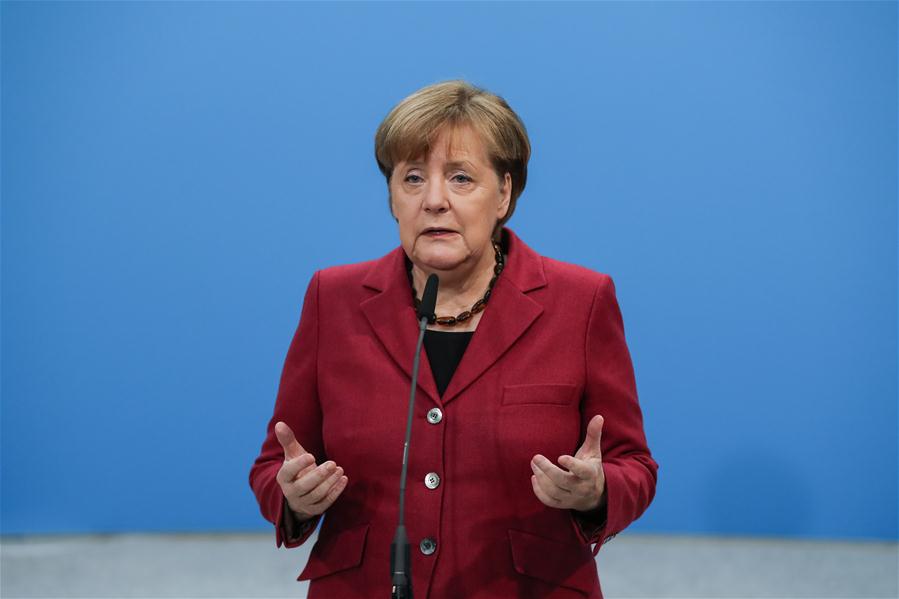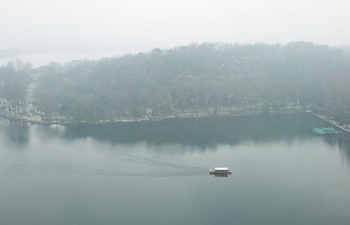
German Chancellor and leader of German Christian Democratic Union (CDU) Angela Merkel delivers a speech before the start of coalition talks at the CDU headquarters in Berlin, capital of Germany, on Jan. 26, 2018. (Xinhua/Shan Yuqi)
BERLIN, Jan. 26 (Xinhua) --
Following a narrow vote by SPD delegates in favor of finalizing the existing preliminary coalition agreement over the weekend in Bonn, the negotiating parties have announced an ambitious time frame within which they intend to establish a federal government. Speaking to press after the first round of talks, CDU/CSU parliamentary manager Michael Grosse-Broemer said concrete results could be achieved as early as Feb. 2 with two days for necessary subsequent consultations on Feb. 3 and Feb. 4. Previously, German Chancellor Angela Merkel had estimated that an agreement could not be reached before Feb. 8. According to Grosse-Broemer, there was a clear will amongst the parties involved to successfully conclude negotiations within two weeks. The two additional days are a "buffer" to resolve remaining disputes, he said. Merkel, CSU leader Horst Seehofer, and SPD leader Martin Schulz all emphasized on Friday that it was their intention to work swiftly but carefully towards an agreement. The three politicians first held personal talks between themselves, before several larger working groups oriented towards different policy areas came together for more specialized discussions. Merkel in particular is adamant on sealing a governing pact within the ambitious two-week schedule. The Chancellor has highlighted that the more than 400,000-strong SPD membership must still approve a resulting coalition agreement in a party vote. Taking this final hurdle to government formation into account, the CDU, CSU and SPD would struggle to assemble a new federal cabinet prior to Easter unless the current round of talks is successfully concluded by Feb. 8 at the latest. Germany has not had a government since national elections in September 2017, marking the longest ever such period in the country's history. Berlin was thrown into an unfamiliar state of political limbo back in November, when the Free Democratic Party (FDP) triggered the collapse of earlier "Jamaica" coalition negotiations. "The people really expect us to near the formation of a government now," Merkel said. However, senior SPD negotiator and governor of Rhineland-Palatinate Malu Dreyer maintained that it was difficult to tell whether negotiations could really be finished before Feb. 8. "Thoroughness is more important than haste," Dreyer told press. Merkel is under intense pressure to establish what would be her already fourth cabinet and restore Germany's image as a stabilizing force in Europe and beyond. The veteran politician argued that a key task for the next government would be to reinvigorate the country with a "new dynamism". She pointed to projects such as the digitization of schools, facilitating investment, and creating a more favorable regulatory framework for start-ups. Schulz voiced support for these proposals on Friday and further emphasized the need for a strong pro-European Germany in reaction to an increasingly confrontational United States under U.S. President Trump's leadership. CSU leader Horst Seehofer cautioned that final-stage talks would be complicated by recent internal divisions within the SPD, but added that his party would do everything it could "to achieve a good result". Reacting to SPD demands to partially renegotiate provisions on the labor market and health care, and which have surfaced since the party's heated Bonn conference, Merkel further expressed confidence that the existing preliminary coalition agreement offered a good framework to find a mutually-acceptable compromise. During a speech to party delegates in Bonn on Sunday, SPD parliamentary faction leader Andrea Nahles received applause from the audience when she promised to win further policy concessions from the CDU and CSU by "negotiating until the other side squeaks". Nevertheless, a Deutschlandtrend Infratest dimap survey published on Friday by public broadcaster ARD found that a large majority of German citizens did not believe in the SPD's ability to make significant inroads in final-stage coalition negotiations. Only 19 percent of respondents said they would vote for the Social Democrats if elections were held next Sunday, the lowest level of support measured by the pollster since the beginning of opinion polls in 1997.















